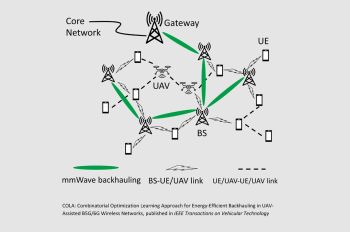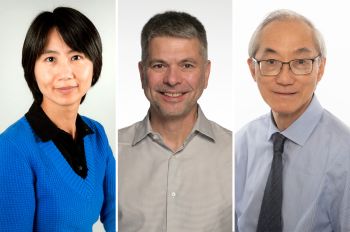Department of Energy Graduate Fellowship Aids Research in Energy Sector Cybersecurity

David Arnold (EE/M.S. CPE ’19) is the recipient of the United States Department of Energy’s Office of Nuclear Energy’s Integrated University Program graduate fellowship to further support his doctoral research efforts in pursuit of the creation of a secure communication network for ultrasonic communication nodes. Arnold was selected among 34 students nationwide to receive one of the prestigious three-year fellowships, which provides $52,000 per year for graduate studies and supports students pursuing nuclear engineering degrees and programs relevant to nuclear energy.
Arnold is pursuing his Ph.D. in computer engineering with a specialization in network security for Internet of Things (IoT), in collaboration with Professor Jafar Saniie, chair of the Department of Electrical and Computer Engineering and Walter and Harriet Filmer Endowed Chair in Electrical and Computer Engineering. In addition, Arnold is also the president and founder of CyberHawks, a student organization with more than 100 members that helps to enhance the cybersecurity engineering degree.
The Integrated University Program Fellowship enables his current research with Saniie, which focuses on cybersecurity within the Internet of Things under the Embedded Computing and Signal Processing (ECASP) Research Laboratory. As a result, Arnold and his team will be able to advance research completed by past ECASP researchers in conjunction with Argonne National Laboratory.
This collaboration entails configuring a cybersecurity protocol for a set of ultrasonic communication nodes within a nuclear power plant. Arnold explains, “These nodes are designed to communicate through solid objects—specifically through facility infrastructures such as walls and pipes—in spaces where traditional radio frequency signals may be hindered or unable to transmit.”
His research team predicts improvements in cybersecurity benefits by segmenting the traditional network into an Ethernet segment and ultrasonic communication network. “My fellow researchers at the ECASP Research Laboratory have already completed research regarding the viability of communicating through solid objects. This fellowship will enable us to begin work on a formal communication protocol and then to research the cybersecurity implications of such a system,” says Arnold.
Arnold shares, “Since last year we’ve been researching potential cybersecurity solutions within the energy sector, primarily regarding IoT networks in smart grid. Our goal is to strengthen the cybersecurity resiliency of our national energy grid, and we found the Integrated University Program’s fellowship for nuclear energy research fit our research objectives. We are excited to use this opportunity to broaden our expertise to encompass more of the energy sector.”
This material is based upon work supported by the Department of Energy, Office of Nuclear Energy, under Award Number DE-NE-0000105.
Disclaimer: “This report was prepared as an account of work sponsored by an agency of the United States Government. Neither the United States Government nor any agency thereof, nor any of their employees, makes any warranty, express or implied, or assumes any legal liability or responsibility for the accuracy, completeness, or usefulness of any information, apparatus, product, or process disclosed, or represents that its use would not infringe privately owned rights. Reference herein to any specific commercial product, process, or service by trade name, trademark, manufacturer, or otherwise does not necessarily constitute or imply its endorsement, recommendation, or favoring by the United States Government or any agency thereof. The views and opinions of authors expressed herein do not necessarily state or reflect those of the United States Government or any agency thereof.”
Photo: A diagram of David Arnold's research on ultrasonic communication nodes.




